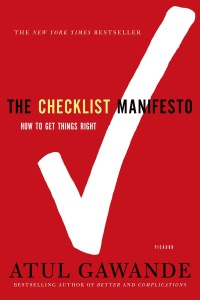‘The Checklist Manifesto: How to get things right’ is an excellent book by a practicing surgeon about his quest to get things right. The book outlines his painstaking efforts to pick up the best practices from various industries and champion the cause of checklists. He presents several interesting examples from aerospace, financial and other sectors where experience and expertise are complemented by procedures and checklists.
He also makes a solid case for heroism out of discipline instead of autocratic individual actions, as we tend to glorify the word. How can we learn from failures and how can we repeat success…these two questions form the main theme of the book, while making a case for individual talent and expertise, getting benefited by checklists.
The book also presents quite a few pointers on how simple and effective a checklist should be, around pause points. Must read for all those who believe in the words of process, procedures and checklists…and need a quick refresher on their importance.
While the book itself itself is not a step by step guide in creating checklists and implementing them, it provides several pointers in this direction. It also showcases the true intent behind the checklists, which is improving communication across the teams and make the individual voice count.
Excerpts
“They trust instead in one set of checklists to make sure that simple steps are not missed or skipped and in another set to make sure that everyone talks through and resolves all the hard and unexpected problems”
“The philosophy is that you push the power of decision making out to the periphery and away from the center. You give people the room to adapt, based on their experience and expertise. All you ask is that they talk to one another and take responsibility. That is what works.”
“Thinking of these essential requirements (of checklists)–simple, measurable, transmissible…”
“When you’re making a checklist, Boorman explained, you have a number of key decisions. You must define a clear pause point at which the checklist is supposed to be used (unless the moment is obvious, like when a warning light goes on or an engine fails). You must decide whether you want a DO-CONFIRM checklist or a READ-DO checklist.”
“It somehow feels beneath us to use a checklist, an embarrassment. It runs counter to deeply held beliefs about how the truly great among us–those we aspire to be–handle situations of high stakes and complexity. The truly great are daring. They improvise. They do not have protocols and checklists…. May be our idea of heroism needs updating.”
“Just ticking boxes is not the ultimate goal here. Embracing a culture of teamwork and discipline is.”
“Discipline is hard–harder than trustworthiness and skill and perhaps even than selflessness. We are by nature flawed and inconstant creatures. We can’t even keep from snacking between meals. We are not built for discipline. We are built for novelty and excitement, not for careful attention to detail. Discipline is something we have to work at.”
Related links
Pictorial depiction of the book


